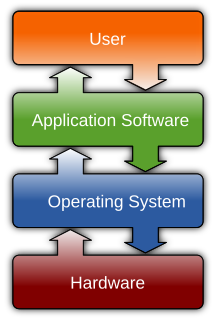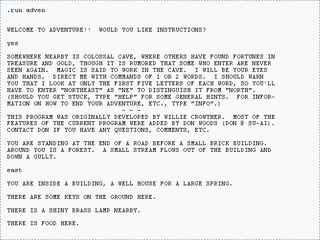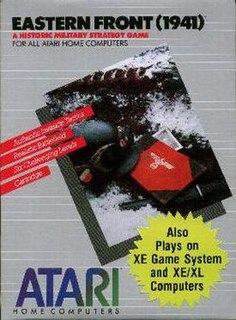External links
- How to Build an Inverse Parser, an essay by Chris Crawford originally published in the Journal of Computer Game Design
An inverse parser, as its name suggests, is a parser that works in reverse. Rather than the user typing into the computer, the computer presents a list of words fitting the context, and excludes words that would be unreasonable. This ensures the user knows all of their options. The concept and an implementation were originally developed and patented by Texas Instruments. A few years later, it was independently developed by Chris Crawford, a game designer, for his game, Trust & Betrayal: The Legacy of Siboot, but the implementation was different enough not to infringe on the patent.

Software is a set of computer programs and associated documentation and data. This is in contrast to hardware, from which the system is built and which actually performs the work.
In computing, a compiler is a computer program that translates computer code written in one programming language into another language. The name "compiler" is primarily used for programs that translate source code from a high-level programming language to a lower level language to create an executable program.
Forth is a procedural, stack-oriented programming language and interactive environment designed by Charles H. "Chuck" Moore and first used by other programmers in 1970. Although not an acronym, the language's name in its early years was often spelled in all capital letters as FORTH.
Infocom was an American software company based in Cambridge, Massachusetts, that produced numerous works of interactive fiction. They also produced a business application, a relational database called Cornerstone.

Interactive fiction, often abbreviated IF, is software simulating environments in which players use text commands to control characters and influence the environment. Works in this form can be understood as literary narratives, either in the form of interactive narratives or interactive narrations. These works can also be understood as a form of video game, either in the form of an adventure game or role-playing game. In common usage, the term refers to text adventures, a type of adventure game where the entire interface can be "text-only", however, graphical text adventures still fall under the text adventure category if the main way to interact with the game is by typing text. Some users of the term distinguish between interactive fiction, known as "Puzzle-free", that focuses on narrative, and "text adventures" that focus on puzzles.
Yacc is a computer program for the Unix operating system developed by Stephen C. Johnson. It is a Look Ahead Left-to-Right Rightmost Derivation (LALR) parser generator, generating a LALR parser based on a formal grammar, written in a notation similar to Backus–Naur Form (BNF). Yacc is supplied as a standard utility on BSD and AT&T Unix. GNU-based Linux distributions include Bison, a forward-compatible Yacc replacement.

Zork is a text-based adventure game first released in 1977 by developers Tim Anderson, Marc Blank, Bruce Daniels, and Dave Lebling for the PDP-10 mainframe computer. The original developers and others, as the company Infocom, expanded and split the game into three titles—Zork I: The Great Underground Empire, Zork II: The Wizard of Frobozz, and Zork III: The Dungeon Master—which were released commercially for a variety of personal computers beginning in 1980. In Zork, the player explores the abandoned Great Underground Empire in search of treasure. The player moves between the game's hundreds of areas and interacts with objects in them by typing commands in natural language that the game interprets. The program acts as a narrator, describing the player's location and the results of the player's attempted actions. It has been described as the most famous piece of interactive fiction.
In computer science, a compiler-compiler or compiler generator is a programming tool that creates a parser, interpreter, or compiler from some form of formal description of a programming language and machine.

Atari BASIC is an interpreter for the BASIC programming language that shipped with the Atari 8-bit family of 6502-based home computers. Unlike most American BASICs of the home computer era, Atari BASIC is not a derivative of Microsoft BASIC and differs in significant ways. It includes keywords for Atari-specific features and lacks support for string arrays, for example.
A CAPTCHA is a type of challenge–response test used in computing to determine whether the user is human.

Syntax highlighting is a feature of text editors that are used for programming, scripting, or markup languages, such as HTML. The feature displays text, especially source code, in different colours and fonts according to the category of terms. This feature facilitates writing in a structured language such as a programming language or a markup language as both structures and syntax errors are visually distinct. This feature is also employed in many programming related contexts, either in the form of colorful books or online websites to make understanding code snippets easier for readers. Highlighting does not affect the meaning of the text itself; it is intended only for human readers.
Parsing, syntax analysis, or syntactic analysis is the process of analyzing a string of symbols, either in natural language, computer languages or data structures, conforming to the rules of a formal grammar. The term parsing comes from Latin pars (orationis), meaning part.

Christopher Crawford is an American video game designer and writer. Hired by Alan Kay to work at Atari, Inc., he wrote the computer wargame Eastern Front (1941) for the Atari 8-bit family which was sold through the Atari Program Exchange and later Atari's official product line. After leaving Atari, he wrote a string of games beginning with Balance of Power for Macintosh. Writing about the process of developing games, he became known among other creators in the nascent home computer game industry for his passionate advocacy of game design as an art form. He self-published The Journal of Computer Game Design and founded the Computer Game Developers Conference.

Trust & Betrayal: The Legacy of Siboot, often abbreviated simply to Siboot, was a game designed and programmed by Chris Crawford for the Macintosh and published by Mindscape in 1987.
Interactive storytelling is a form of digital entertainment in which the storyline is not predetermined. The author creates the setting, characters, and situation which the narrative must address, but the user experiences a unique story based on their interactions with the story world. The architecture of an interactive storytelling program includes a drama manager, user model, and agent model to control, respectively, aspects of narrative production, player uniqueness, and character knowledge and behavior. Together, these systems generate characters that act "human," alter the world in real-time reactions to the player, and ensure that new narrative events unfold comprehensibly.
A human interface device or HID is a type of computer device usually used by humans that takes input from humans and gives output to humans.
A lightweight markup language (LML), also termed a simple or humane markup language, is a markup language with simple, unobtrusive syntax. It is designed to be easy to write using any generic text editor and easy to read in its raw form. Lightweight markup languages are used in applications where it may be necessary to read the raw document as well as the final rendered output.
XPL is a programming language based on PL/I, a portable one-pass compiler written in its own language, and a parser generator tool for easily implementing similar compilers for other languages. XPL was designed in 1967 as a way to teach compiler design principles and as starting point for students to build compilers for their own languages.

Eastern Front (1941) is a computer wargame for the Atari 8-bit family created by Chris Crawford and published through the Atari Program Exchange (APX) in 1981. A scenario editor and assembly language source code for the game were also sold by APX.

Legionnaire is a computer wargame for the Atari 8-bit series created by Chris Crawford in 1982, and released through Avalon Hill. Recreating Julius Caesar's campaigns in a semi-historical setting, the player takes command of the Roman legions in real-time battles against the barbarians.